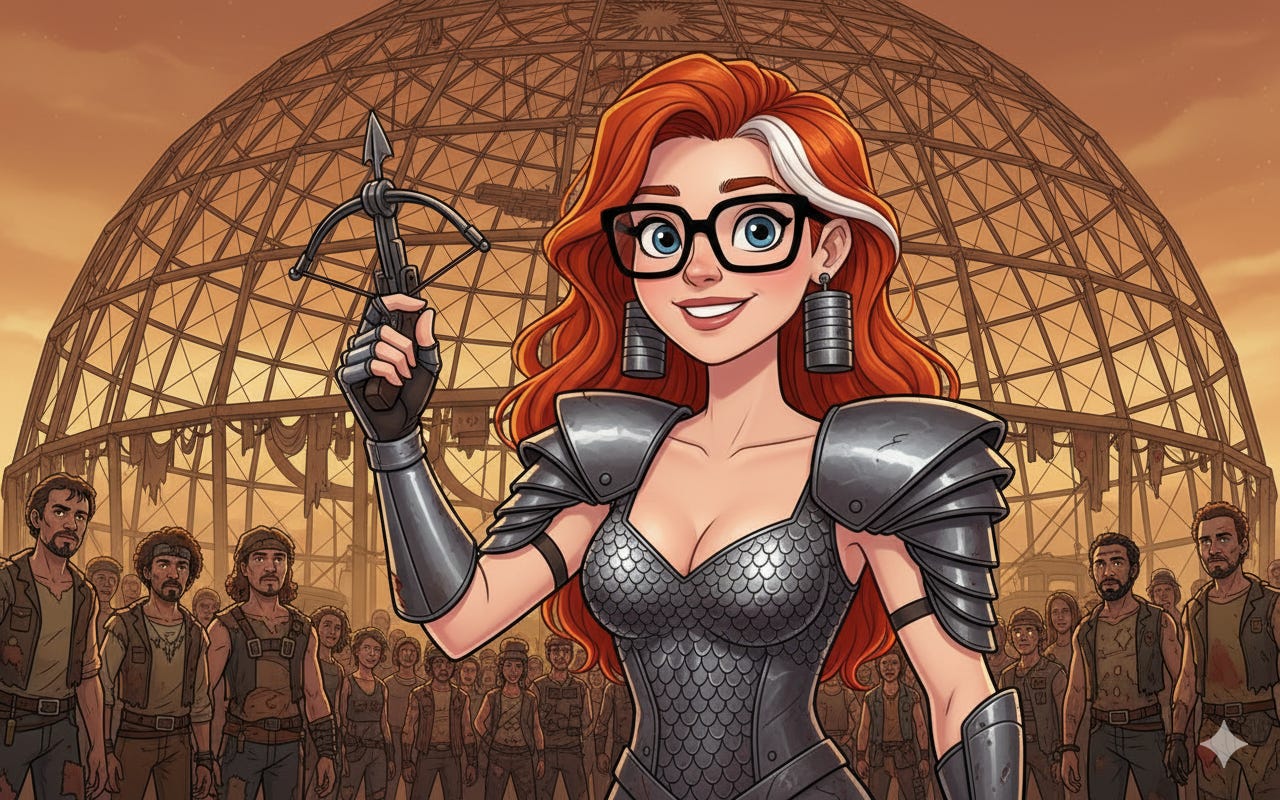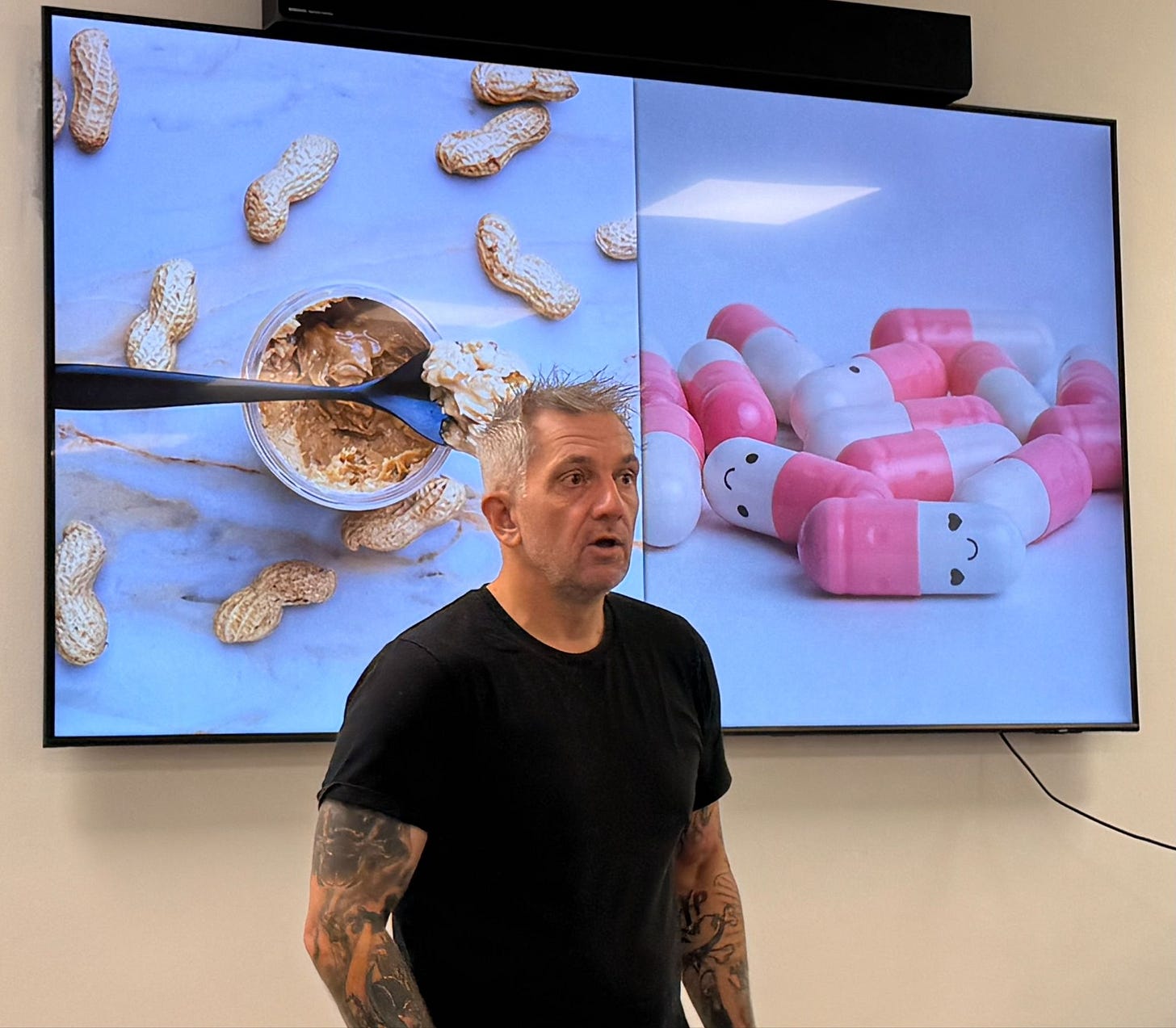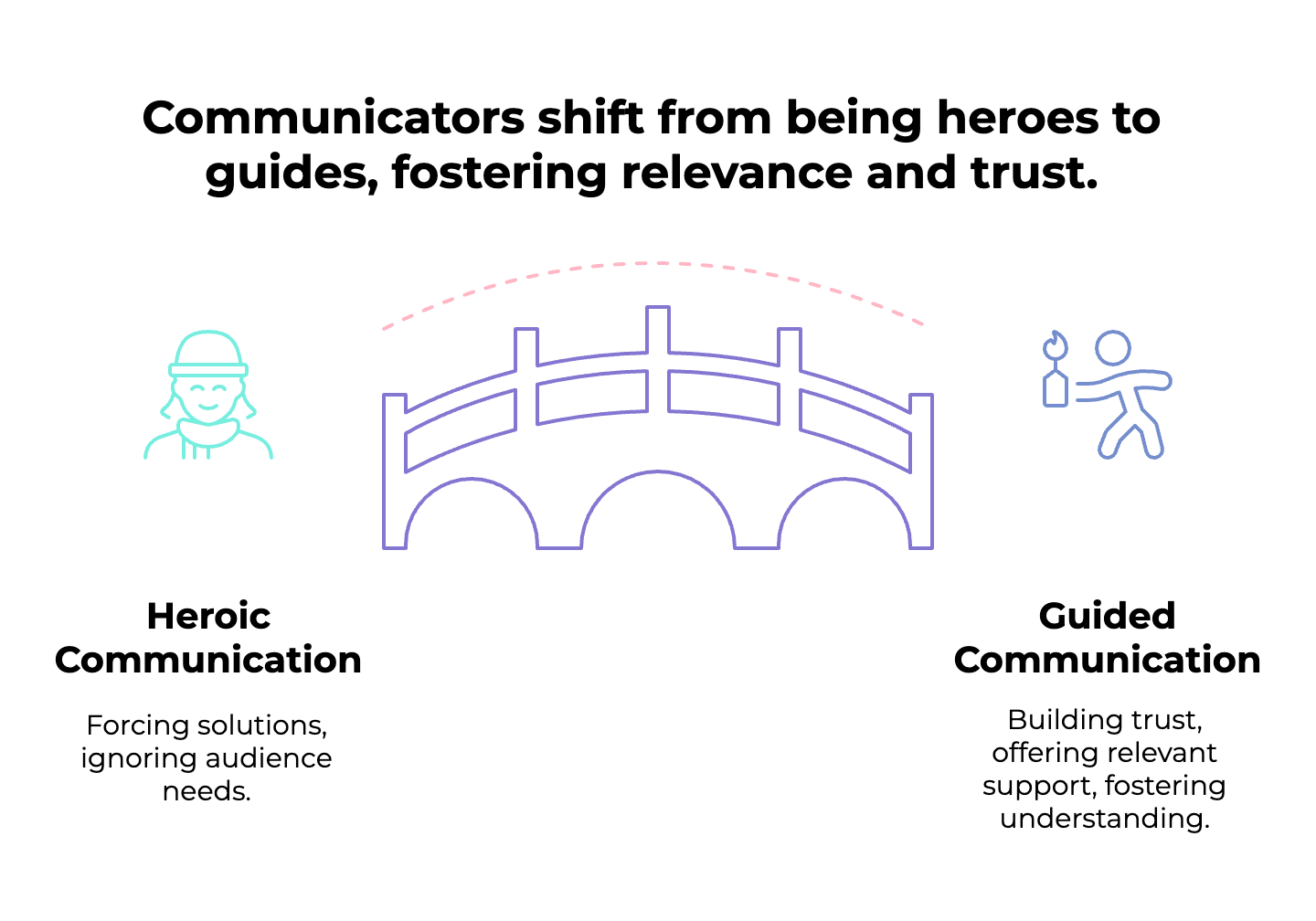We Don’t Need Another Hero
Audition for a better part in other people’s stories by communicating like a guide in their wasteland
🌸 ikigai 生き甲斐 is a reason for being, your purpose in life - from the Japanese iki 生き meaning life and gai 甲斐 meaning worth 🌸
If you get a chance to see Rich Mulholland talk, grab it with both hands! (He’s a South African we are blessed to have living on the Isle of Man, who teaches communication through stories that stick.) A Thursday breakfast talk that kicked off with a dog called Murphy and a jar of peanut butter taught me more about effective communication than anything I’ve heard in a long while.
This tattooed bundle of energy had me completely. “Too much medicine, not enough peanut butter, and the dog just looks at you like you’re an idiot.”
I left feeling emotional in the best way… like I’d just watched an iconic film from my youth (Mad Max, with survivors navigating a post-apocalyptic wasteland if it wasn’t obvious hehe). When something becomes so recognisable, so linked to bloody awesome imagery with purpose or passion, that it starts being a creation that entertains and matters.
Less than a week before turning fifty, and this presentation strategist has seriously made me rethink my approach to being useful in the world. How often have I been forcing pills down people’s throats, wondering why they keep spitting them out?
Worse even, do people think I’m trying to be the hero in their story? A protagonist, one who swoops in with solutions and perfectly packaged answers. When really, I want to audition for a supporting role in a film that I know will never be about me.
I need to better align my ikigai with story-selling. Show a problem, prove I understand your world, offer a humane next step that respects autonomy. That’s persuasive and ethical, purpose that actually lands.
We’re all wandering our own wastelands, looking for guides who understand the terrain. Not saviours. Not heroes. Just someone who’s walked this path before and knows where the water is.
Can you be a good supporting act?
There’s a man who works at a busy airport departures, trying to get you to use his taxi service. Every day, thousands of people rush past ignoring him entirely. He’s living his entire movie… waking up, getting dressed, commuting, working his shift, going home, having dinner, maybe watching telly, going to sleep. His whole life. His starring role.
And to everyone streaming past with their boarding passes and their important meetings ignoring him, he’s scenery. Background. An extra.
Rich used this imagery to remind us of the feeling of sonder… the realisation that every person you pass is living a life as vivid and complicated as your own. That man in the airport is the lead character in his own film, and in yours he’s just “this one little thing, a poor man”.
When the credits roll at the end of someone’s life, you’re just a line in the scroll. Maybe you’re “helpful colleague” or “that person who said the thing that one time”. You’re not the hero. You were never meant to be.
Nobody gives a shit about your story unless it intersects with their plotline.
People are busy being the star of their own show. They’ve got their own dragons to fight, their own scenes to navigate, their own storyline to follow. Your brilliant idea, your urgent message, your carefully crafted expertise… it only matters if it helps them with the film they’re already in.
Communication goes sideways when we try to grab the lead role in someone else’s story, here’s the shift in thinking we need;
From “Here’s what I do” to “Here’s the scene you’re in, and the part I can play to help your film be even better”
From proving brilliance to proving relevance
From “Look at me” to “Look what becomes possible for you”
Another of Richard’s genius examples… if you try to tell a room full of bankers a new way to do banking they’ll think “this idiot can’t possibly know more about banking than we do”.. but tell a story about an airline customer loyalty innovation and have them picture themselves enjoying it too, and suddenly they’re leaning forward going “oh, that’s clever”... then you can bring the story back around to how it could relate to banking later.
Because ethos (trust) and pathos (care) precede logos (logic). If people can’t see themselves in the story, the facts don’t land. They just bounce off like hailstones on a windscreen.
Your job isn’t to steal the spotlight. It’s to audition for a better part in their story. Maybe you’re the guide who knows where the water is in their wasteland. Maybe you’re the person who points out there’s actually a dragon in the room. Maybe you’re just the one who made a complicated scene feel a tiny bit more manageable.
But you have to start by understanding it’s their film. Not yours. You’re just trying to be useful in their wasteland, and we often struggle to articulate that effectively.
Ethos, pathos, logos (for your ikigai toolkit)
Aristotle explored rhetoric, persuasive communications, a long time ago with the pillars of the head, the heart, the gut.
Rhetoric 101 should be taught everywhere, not just in Eton and schools like it. I think it’s another reason why the inequality divide keeps widening. We should encourage speaking, storytelling and translation into local life skills. If we want inclusive progress, we must teach people to be heard and to understand.
You can be the smartest person in the room, but if you can’t translate your knowledge into something recognisable, you’re just noise and people tune out whilst nodding sympathetically.
Logos (the head) is the logic. The facts. The “here’s why this makes sense” bit. Most of us start and end here because it feels safe. Clean. Objective.
Pathos (the heart) is the feeling. The “here’s why you should care” bit. The story that makes the data stick. The peanut butter around the pill.
Ethos (the gut) is the trust. The “here’s why you should believe me” bit. And this is where most communication falls apart, because ethos has to be earned. Politics and public debate seems to have lost it entirely. We’ve vilified the opposition to the point where we can’t even hear each other anymore, let alone trust each other.
Your purpose needs all three in the right ratio and order, the hatarakigai (work worth doing) aspect of ikigai asks us; What do you love? What are you good at? What does the world need? What can you be paid for?
When these four things overlap, you’ve found a powerful reason for being, but nobody else can see that unless you communicate it with ethos, pathos, and logos.
You need the head (logic), the heart (feeling) and the gut (trust). All three. Not just the bit you’re comfortable with.
Logos feels achievable to most, we can build arguments, structure a case, lay out the facts (or get AI to help us *grin*)... but without pathos, without the story that helps people feel why it matters, the logic just sits there like a pill on the kitchen counter. And without ethos, without people trusting that we understand their world and genuinely want to help, they won’t swallow it anyway.
Purpose that lands needs all three pillars. When they align, you stop selling and start serving.
Peanut butter, then pill (how messages stick)
Murphy the dog won’t take the pill. Too much medicine, not enough peanut butter, and he just looks at you like you’re an idiot.
Richard’s metaphor is perfect because we all do this. We lead with the facts, the stats, the important information we desperately need people to understand… and then we wonder why they’re not swallowing it.
The ratio matters.
Metaphor first, then mechanics. Lead with the image that carries the point. The story that makes the abstract concrete. Then layer in the details.
Stats and facts as seasoning, not the meal. Data backs the story, it doesn’t carry it. Nobody remembers the percentage. They remember the core message if they resonate with the story about why they should care.
One action, not five. Choice overload kills momentum. Give people the smallest useful step. Not a whole transformation plan. Just, here’s the next thing.
Quick test before you publish or present;
Can a tired person repeat the point in one line?
Would a non-expert care why this matters?
Is there one, single, obvious next step?
If the answer to any of these is no, you might need more peanut butter.
Go where people already are
If your audience looks blank, you might also need your story to paint a better map with some easier pathways.
The curse of knowledge is real. You think about your thing all day, every day. You speak in the language you know, the words your world uses, the frameworks that make perfect sense to you. And people smile politely, nod and later do absolutely nothing with what you’ve said.
There’s a simple trick to making people care, find something that universally applies… for example, everyone who drives knows about parking.
Parking is pretty much universal. You don’t need to explain parking to those who already drive. So if you’re trying to convey something complicated, governance, systems change, resource allocation, talk about parking first. Or dogs, lots of people love dogs more than most humans hehe.
Go where people already are. Meet them in their actual world before asking them to hike over to yours.
Start in their scene, not yours. Their Tuesday morning with three systems and ten tabs open. Their queue at the post office. Their stressy school run when nothing’s working as planned.
Use their terrain as your map. School runs, parking spaces, work stress… the stuff they already know. Then layer your expertise on top of that foundation.
Structure beats swagger. Every time. And approaching fifty, the skill I need to hone the most is the humility to translate what I know most effectively in service of others. To be the guide who knows the terrain, not the hero who conquers it for them.
The talk structure you can steal
Let’s think about structures that work for story telling with purpose;
1. Story first — Lead with the metaphor. Murphy needs peanut butter to take his pill. The man in the airport living his whole movie. Something concrete and visual from their world that will get them nodding in recognition.
2. Connect it — Here’s what this means for you. “We do the same thing when we try to communicate… too much pill, not enough peanut butter.”
3. Name their dragon — This is why your messages aren’t landing. This is what you’re losing.
4. One small step — Here’s what changes when you fix the ratio.
The story does the work. The connection makes it relevant. The dragon makes it urgent. The step makes it doable.
“You know that feeling when you’re on stage in a dream and you’ve forgotten your lines? Everyone’s waiting. You’re frozen. (story) That’s what misaligned work feels like, you’re on stage but the script doesn’t fit. (connect) The gap between who you are and what you’re doing steals energy you don’t have to spare. (dragon) Let’s spend 30 minutes mapping your ikigai and see if we can find your actual lines. (step)”
Beyond Thunderdome
Less than a week before I turn fifty, and Rich reminded me that we don’t need another hero.
We need guides. People who’ve walked the wasteland and know where the water is. People who help others see their dragons. Who translate complex ideas into something as relatable as parking spaces. Who build maps with steps everyone can climb.
I’m auditioning for supporting roles in stories that aren’t mine. And that’s exactly where a strong ikigai felt sense lives… in the utility, the service, the humane next step.
I’m aware this sounds different coming from a woman. We’re often socialised into supporting roles from birth, taught to centre others, to guide quietly, to make ourselves useful in the background. So when I say I’m choosing the guide role, I mean it as conscious expertise, not conditioned diminishment. The difference between being relegated to scenery and strategically positioning yourself as the person who knows where the water is? That’s everything. I’m finally clear on which one I’m doing.
Turning fifty feels freeing. Less ego, more effect.
My ikigai hasn’t changed, but how I communicate it has. Or at least, how I want to communicate it from here.
Purpose isn’t a paragraph on a website. It’s the story that makes the next choice feel obvious. For them, and for you.
So I’ll keep working on my pitch, re-articulating it as service;
“Every week, I show up here seeking ikigai alongside you. I’m still walking the wasteland and I’ve learned some things along the way.
Someone who’s a few steps ahead on some paths, still figuring it out on others, and willing to say “here’s what I’ve learned, see if it helps.”
Week by week, we’re all just auditioning for better parts… in our work, our purpose, our lives. I write to make that audition a bit clearer, a bit kinder, a bit more possible.”
That’s the work. That’s the reason I keep showing up.
One week left of forty-nine. What part am I auditioning for in your life?
Not the hero, but a guide. Preferably the one who knows where the water is.
Sarah, seeking ikigai xxx
PS Try a tiny experiment periodically, pick one conversation or post and run the checklist;
Did I start in their scene?
Did I name the dragon they actually face?
Did I use one metaphor before any metrics?
Is my next step low-friction and specific?
Will they feel right about the choice afterwards?
If nothing changed resultswise, maybe we need to rewrite the scene?
PPS Bullet journal spreads to map your persuasive purpose;
The Scene Audit — List five scenes your people are actually in (their Monday mornings and their struggles)
Dragon Inventory — What problems do the people you serve genuinely face? Not what you think they should care about, what they actually lose sleep over
Translation Practice — Take your most complex idea and explain it three ways using everyday analogies (parking, cooking, pets, school runs)
Ethos/Pathos/Logos Balance — Which pillar do you lean on? Which needs work?
Supporting Role Tracker — Whose story are you part of? What part are you playing? What part do you want to audition for?
PPPS Want to sharpen your ikigai pitch with AI? Try this prompt;
“Help me translate my purpose into a story someone could hear once and remember. I do [your work]. The people I serve struggle with [their dragon]. I help them [the shift]. Give me three different ways to frame this using analogies from everyday life… parking, cooking, travel, pets, weather. Make it feel obvious, not clever.”
PPPPS — This week’s soundtrack has to be Tina Turner’s “We Don’t Need Another Hero” from Mad Max Beyond Thunderdome because sometimes you need to remind yourself that the wasteland needs guides, not saviours… and at fifty, you’re starting to feel wise enough to know the difference.
Perfect for anyone learning to communicate purpose by stepping out of the spotlight and into something more useful 🎵




